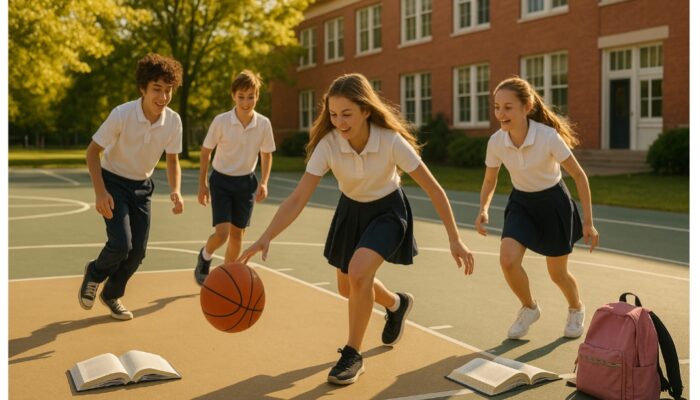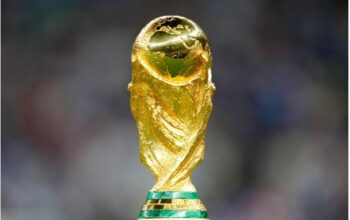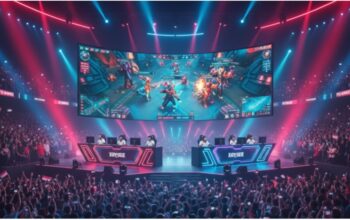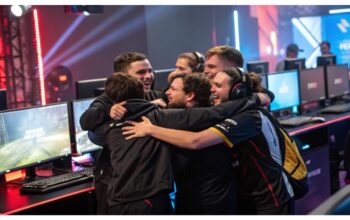Sport and education share a simple, powerful purpose: to develop human potential. Whether on a school pitch, in a university lab, or at a community coaching clinic, athletics teach physical skills while classrooms teach the cognitive, social, and ethical foundations that let those skills matter. Over the last decade the relationship between sport and education has deepened — driven by science-based coaching, formal dual-career pathways, and new funding and learning models. This article explores how the two fields support each other, why integrated programs matter for athletes and communities, and how neutral commercial activities — including regulated betting and gaming products such as Parimatch slot — can intersect with education responsibly when paired with transparency, strict age verification, and financial-literacy efforts.
From playgrounds to podiums — the education inside sport
Sport is an informal school from day one. Children learn coordination, teamwork, and the basics of fair play long before they encounter formal instruction. Structured sports programs add layers of learning:
Physical literacy — movement competence that underpins lifelong activity
Social skills — communication, leadership, and conflict resolutionCognitive skills — tactical thinking, decision-making under pressure, and attention control
Emotional skills — resilience, goal-setting, and coping with loss
These are transferable skills. Coaches who design sessions around learning objectives help athletes build habits that translate to academic and professional contexts. Schools that treat sport as a curriculum subject — not only as recreation — see better outcomes in student attendance, self-esteem, and classroom behavior.
Dual careers and athlete education pathways
High-performance sport increasingly demands early specialization, but the risk of narrow development has led to popular dual-career models. Dual-career programs let athletes combine performance training with formal study so they avoid the “sport or study” trade-off.
Key features of effective dual-career systems:
Flexible timetables — classes and exams that accommodate training loads
Distance and blended learning — online modules that travel with athletes
Career counselling — planning for post-athletic careers in coaching, business, or another profession
Scholarships and financial support — to ease economic pressure while studying
Universities and professional clubs collaborate more than ever. Joint degrees in sports science, sports management, and data analytics give athletes and practitioners the theory and tools to succeed both on and off the field.
Coaching education and evidence-based practice
A big reason sport and education have come closer is the science behind coaching. Modern coach education programs combine pedagogy with sports science and data literacy:
Periodisation and load management — to avoid overuse injuries and optimize performance
Performance analytics — interpreting GPS, heart-rate, and video data in a learning-centred way
Psychological skills training — resilience, focus, and team culture
Safeguarding and welfare — ethical conduct, child protection, and mental-health first aid
Accredited coaching pathways give teachers and coaches formal qualifications. When coaches are trained as educators, practices become more inclusive, safer, and more effective at developing both athletes and people.
Schools, universities, and community uplift
Education institutions are increasingly anchors of sporting ecosystems. Well-designed school sport programs create broad participation; university teams bridge grassroots and elite pathways; community facilities offer accessible programming for all ages.
Programs that work well share a few principles:
Accessibility — low barriers to entry and affordable options
Quality coaching — trained staff and continuing professional development
Clear pathways — from fun, recreational sessions to competitive opportunities
Partnerships — between schools, clubs, local government, and private partners
The outcome is not just better athletes. Communities benefit from healthier populations, reduced antisocial behavior, and stronger civic ties.
Education for careers in sport — beyond playing
Sport needs a workforce: physiotherapists, analysts, event managers, coaches, marketers, and integrity officers. Education creates that supply chain. Practical, industry-linked courses — internships, live projects, and mentorships — give students exposure to real-world operations.
Emerging fields include:Sports analytics — applying data science to scouting and performance
Event technology and operations — staging safe, fan-friendly competitions
Sports governance and compliance — managing ethics, anti-doping, and match integrity
Digital content and community management — building fan engagement online
These roles attract diverse talent and create long-term career options for those who love sport but may not play professionally.
The role of commercial funding — sponsorship, scholarships, and responsibility
Sporting programs often need funding beyond public budgets. Sponsors and commercial partners provide capital for facilities, scholarships, and coaching programs. In some markets licensed betting operators form part of that commercial mix — sponsoring competitions, supporting grassroots initiatives, and occasionally underwriting scholarships.
A few guiding principles make such partnerships acceptable in educational contexts:
Transparency — clear disclosure of funding sources and how money is used
Compliance — partners must meet legal and ethical standards, including age controls and anti-money-laundering safeguards
Responsible messaging — marketing must not target minors or present gambling as a solution to financial problems
Community benefit — funding should support access, education, and player welfare rather than purely branding
When regulated operators contribute under these rules, funding can expand opportunities for coaches, students, and facilities. Education programs can also offer curricula on financial literacy and risk awareness so that young people understand the implications of gambling.
Teaching integrity and critical thinking
Education in sport must include ethics. Modules on integrity, critical thinking, and media literacy help athletes navigate a complex environment that includes betting markets, sponsorship influences, and social media pressures.
Practical lessons include:Understanding match manipulation risks — how betting markets work and red flags
Media training — managing interviews and social presence responsibly
Financial literacy — budgeting, avoiding scams, and planning for life after sport
Embedding these topics helps protect athletes and strengthens the whole sporting ecosystem.
E-sports, digital skills, and new learning frontiers
Sport education now includes e-sports and digital-skill development. E-sports academies teach teamwork, reaction training, and digital wellness while media production courses prepare students to create streaming content, manage communities, and build sponsorship models.
Digital-native programs are also practical laboratories for broader education goals — coding, UX design, and analytics skills that transfer across industries.
Conclusion — a virtuous cycle
When sport and education work together intentionally the benefits multiply. Athletes receive balanced development; communities grow healthier; and the sport industry gains a professional workforce focused on welfare and excellence. Commercial partners — including regulated operators in some contexts — can help resource these programs, but only when partnerships respect education values, transparency, and responsible practice.
For educators, coaches, and policymakers the challenge is simple and urgent: design systems that treat sport as education, not entertainment alone. Do that, and the playing field becomes a classroom that prepares young people not just to win matches, but to succeed in life.












